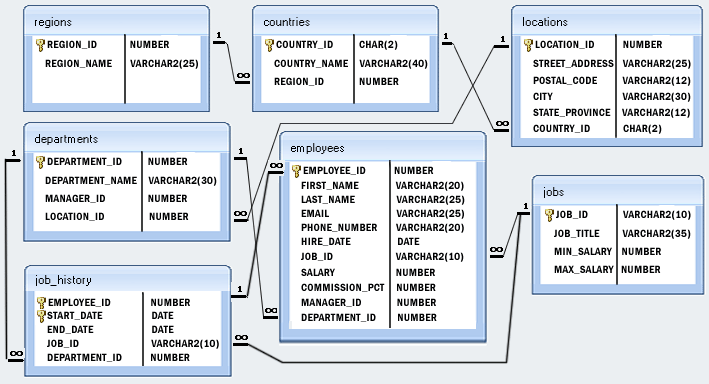

PostgreSQL Subquery [21 exercises with solution]
1. Write a query to find the names (first_name, last_name) and salaries of the employees who have higher salary than the employee whose last_name='Bull'.
SELECT first_name, last_name, salary FROM employees WHERE salary > (SELECT salary FROM employees WHERE last_name = 'Bull');
Sample table : employees
2. Find the names (first_name, last_name) of all employees who works in the IT department.
SELECT first_name, last_name FROM employees WHERE department_id IN (SELECT department_id FROM departments WHERE department_name='IT');
Sample table : employees
3. Find the names (first_name, last_name) of the employees who have a manager who works for a department based in United States.
SELECT first_name, last_name FROM employees WHERE manager_id in (select employee_id FROM employees WHERE department_id IN (SELECT department_id FROM departments WHERE location_id IN (select location_id FROM locations WHERE country_id='US')));
Hint : Write single-row and multiple-row subqueries
Sample table : employees
Sample table : departments
Sample table : locations
4. Find the names (first_name, last_name) of the employees who are managers.
SELECT first_name, last_name FROM employees WHERE (employee_id IN (SELECT manager_id FROM employees));
Sample table : employees
5. Find the names (first_name, last_name), salary of the employees whose salary is greater than the average salary.
SELECT first_name, last_name, salary FROM employees WHERE salary > ( SELECT AVG(salary) FROM employees);
Sample table : employees
6. Find the names (first_name, last_name), salary of the employees whose salary is equal to the minimum salary for their job grade.
SELECT first_name, last_name, salary FROM employees WHERE employees.salary = (SELECT min_salary FROM jobs WHERE employees.job_id = jobs.job_id);
Sample table : employees
Sample table : jobs
7. Find the names (first_name, last_name), salary of the employees who earn more than the average salary and who works in any of the IT departments.
SELECT first_name, last_name, salary FROM employees WHERE department_id IN (SELECT department_id FROM departments WHERE department_name LIKE 'IT%') AND salary > ( SELECT avg(salary) FROM employees);
Sample table : employees
Sample table : departments
8. Find the names (first_name, last_name), salary of the employees who earn more than Mr. Bell.
SELECT first_name, last_name, salary FROM employees WHERE salary > (SELECT salary FROM employees WHERE last_name = 'Bell') ORDER BY first_name;
Sample table : employees
Sample table : departments
9. Find the names (first_name, last_name), salary of the employees who earn the same salary as the minimum salary for all departments.
SELECT * FROM employees WHERE salary = ( SELECT MIN(salary) FROM employees);
Sample table : employees
Sample table : departments
10. Find the names (first_name, last_name), salary of the employees whose salary greater than average salary of all department.
SELECT * FROM employees WHERE salary > ALL(SELECT avg(salary) FROM employees GROUP BY department_id);
Sample table : employees
11. Write a query to find the names (first_name, last_name) and salary of the employees who earn a salary that is higher than the salary of all the Shipping Clerk (JOB_ID = 'SH_CLERK'). Sort the results on salary from the lowest to highest.
SELECT first_name,last_name, job_id, salary FROM employees WHERE salary > ALL (SELECT salary FROM employees WHERE job_id = 'SH_CLERK') ORDER BY salary ;
Sample table : employees
12. Write a query to find the names (first_name, last_name) of the employees who are not supervisors.
SELECT b.first_name,b.last_name FROM employees b WHERE NOT EXISTS ( SELECT 'X' FROM employees a WHERE a.manager_id = b.employee_id);
Sample table : employees
13. Write a query to display the employee ID, first name, last names, and department names of all employees.
SELECT employee_id, first_name, last_name, (SELECT department_name FROM departments d WHERE e.department_id = d.department_id) department FROM employees e ORDER BY department;
Sample table : employees
Sample table : departments
14. Write a query to display the employee ID, first name, last names, salary of all employees whose salary is above average for their departments.
SELECT employee_id, first_name FROM employees AS A WHERE salary > ( SELECT AVG(salary) FROM employees WHERE department_id = A.department_id);
Sample table : employees
Sample table : departments
15. Write a query to find the 5th maximum salary in the employees table.
SELECT DISTINCT salary FROM employees e1 WHERE 5 = (SELECT COUNT(DISTINCT salary) FROM employees e2 WHERE e1.salary <= e2.salary);
16. Write a query to find the 4th minimum salary in the employees table.
SELECT DISTINCT salary FROM employees e1 WHERE 4 = (SELECT COUNT(DISTINCT salary) FROM employees e2 WHERE e1.salary >= e2.salary);
17. Write a query to select last 10 records from a table.
SELECT * FROM ( SELECT * FROM employees ORDER BY employee_id DESC LIMIT 10) sub ORDER BY employee_id ASC;
18. Write a query to list department number, name for all the departments in which there are no employees in the department.
SELECT * FROM departments WHERE department_id NOT IN (select department_id FROM employees);
Sample table : employees
Sample table : departments
19. Write a query to get 3 maximum salaries.
SELECT DISTINCT salary FROM employees a WHERE 3 >= (SELECT COUNT(DISTINCT salary) FROM employees b WHERE a.salary <= b.salary) ORDER BY a.salary DESC;
Sample table : employees
20. Write a query to get 3 minimum salaries.
SELECT DISTINCT salary FROM employees a WHERE 3 >= (SELECT COUNT(DISTINCT salary) FROM employees b WHERE a.salary >= b.salary) ORDER BY a.salary DESC;
Sample table : employees
21. Write a query to get nth max salaries of employees.
SELECT * FROM employees emp1 WHERE (1) = ( SELECT COUNT(DISTINCT(emp2.salary)) FROM employees emp2 WHERE emp2.salary > emp1.salary);
Sample table : employees
...More
Structure of 'hr' database :

More .....
Practice Online
